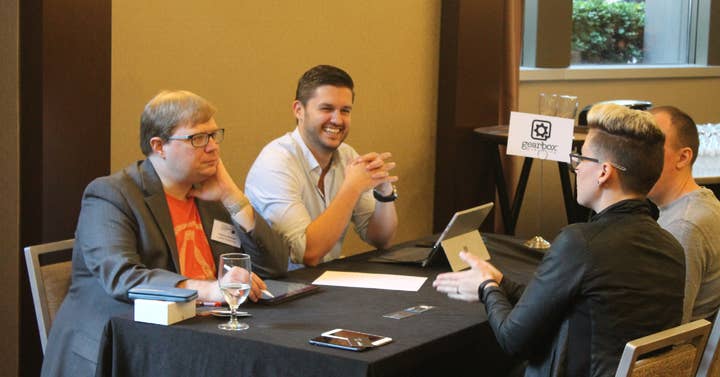What to do (and not to do) when networking and building your contact book
Games industry professionals give tips on how to "dive in" at networking events and make a great first impression
The word alone is enough to make many of us shudder: networking.
But while even the thought of it might conjure up unpleasant memories of clammy handshakes and stale sandwiches, the truth is -- like it or not -- networking is critical for anyone looking to build their contacts and establish a career in gaming.
No matter where you want to work in games -- development, publishing, journalism, marketing, you name it -- chances are, you'll need to network at some point... even if it's just a little bit.
The good news? Networking isn't nearly as difficult as we sometimes make it out to be. It's all about making connections, be they formal, informal, online, in-person, temporary, or long-lasting -- and it's up to you to make them meaningful.
We spoke to a handful of gaming professionals from across the world at a range of different studios, big and small, to get their top tips on how to make a great first impression and bulk up your contacts book.
How to make a great first impression
It's a cliché, yes, but like a lot of clichés, it's true -- you really do only get one chance to make a first impression.
But while it may feel as though everyone around you is super confident and sociable, the truth is, even the most self-assured of us feel a little uncertain from time to time.
"Everyone is in the same boat, so being empathetic to everyone you meet is key"Max Downton, Splash Damage
"Everyone gets imposter syndrome... it's just another way of saying we lack self-confidence," says Coatsink management assistant Emma Blenkinsop. "Most people like talking about themselves, especially when those listening appear interested in what they're saying. If you ask questions of others, you'll quickly realise how much you have in common and how easy it is to build a rapport."
As for how to get the conversation started? Max Downton, senior brand manager at Splash Damage recommends that we should be ourselves, "talk proudly" about the things we're passionate about, ask questions, and be attentive to the people we're talking to.
"Everyone is in the same boat, so being empathetic to everyone you meet is key," he says.

Sezzy Beasley, HR business partner at Improbable Games Canada, suggests that people who take the time to listen and ask thoughtful questions are more memorable than those who "breeze through the conversation or make any sales pitches."
She adds: "From my experience, the people who made the best impressions came to the event to learn and focused on the goal of meeting people."
Skyhook Games' David Harper also reminds us "that people like doing business with people they like."
"So go along, be yourself (unless you can be Batman, always be Batman) and work on the friendships first," he advises. "If there is business to be had, that will come. If not, you just made yourself some new friends."
Good communication starts with being a good listener
No one wants to be next to the person who butts in, makes their elevator pitch, and then sidles away again. Memorable connections start when people are relaxed, friendly, and willing to listen as well as talk.
"Remember that the majority of the people at the event feel just as nervous and uncomfortable as you do," advises Beasley. "You don't need to prove anything about yourself, just be honest and genuine about connecting with other people and hearing about their experiences."

Blenkinsop agrees, stating that being a good listener is as important as anything you may have to say. If you relax and take your time to listen and ask thoughtful questions, "the end result will be a much more meaningful and rewarding interaction for all involved."
Don't be afraid to "dive in"
We all know that networking can be challenging, no matter how established your career is -- but it can be especially intimidating for early-career developers.
Rebellion brand manager, Abbie Dickinson, felt as though everyone in the games industry already knew each other really well when she started out, but once she started introducing herself, she found that most people were "extraordinarily friendly" and more than willing to chat.
That's why it's important to "dive in", according to Downton.
"It's the most terrifying piece of advice I've been given, but it really is the only way to approach it in my experience," he admits. "You can't rely on people coming to you, as nice as that is, and lots of people will feel the same way that you are."

Approaching it entirely as "work" might not necessarily work for everyone, either. As Skyhook's Harper suggests, good networks are forged when people "go along to make new friends, not to only talk to people who you think might be able to do something for you."
"What makes networking daunting for most people is the initial approach and what to say. You don't need a killer line, a simple introduction and ask them how they are enjoying the event will do," he says. "Everyone at a networking event is there to meet new people. You have just as much right to be there as anyone else. Do your homework, have a few opening lines worked out and be interested in the person you have just met. Ask about them first, then if they ask, tell them about yourself.
"Like anything in life, the first one is the hardest, so if this is your first event just keep it simple and aim to have a two-minute conversation with one new person," he continues. "Introduce yourself, ask them if you can join them and how they are enjoying the event."
Keep it local where you can

As Rebellion's Dickinson rightly reminds us, "it's a big commitment, financial and otherwise, to travel to the big events."
Therefore, before spending the time and money needed to travel to a big conference or trade show, you might find it easier -- and perhaps even a little less intimidating -- to see what's happening closer to home first.
"If you aren't sure where to start, or you don't see any events in your area, reach out to the organisers, the universities, even game studios in your area and ask what events are going on," she suggests.
"It's not all about your GDCs or EGXs. You can meet people, make friends and awesome contacts at a more local level. You'd be surprised how many game nights, meet-ups and talks are organised by incredible teams around the country."
Practical tips for people who struggle with networking
If you're still a little unsure on how best to start networking with confidence, here's a curated list of ideas from our respondents to help if you struggle with social situations and meeting new people:
"It's not all about your GDCs or EGXs. You can meet people, make friends and awesome contacts at a more local level"Abbie Dickinson, Rebellion
- Attend events with a friend if possible
- Ask who the other person works for and what they do
- Starting with a compliment can be an "excellent way to say hi"
- You don't have to be loud or forceful to be memorable
- Swap contact details if you can; you can follow up an introduction with a polite email afterwards
- If it feels like it isn't working out, that's okay; just smile, say it was great meeting them, and tell them you hope they enjoy the rest of the event and move on
Try meeting people online through virtual networks and meet-ups
The industry's unexpected pivot to online meetings might actually be better for those who lack confidence or are just starting out, too.
"Online networking events are a great place to start and make it a lot easier (and I suppose less awkward) to lurk and not necessarily say anything," Dickinson says. "It's a good place to make some like-minded contacts that you can build a friendship/rapport with, [and] you can even attend in-person events together in the future. Face-to-face events are a lot easier and a lot more fun when you know at least one other person."
While online events might seem a bit overwhelming at first -- especially if you're new and don't know anyone just yet -- you can not only attend many online networks for free, saving on travel and drinks/food, but you can do so in your favourite joggers and slippers, too.

"It also allows a much wider variety of people to attend the events," Dickinson adds. "If you're based somewhere a bit more remote, or from a smaller team who can't afford to travel to the big events, it's nice to see so many new and diverse faces."
Beasley believes there are pros and cons to both in-person and online networking, and admits it can be difficult -- not to mention a bit intimidating -- to "insert yourself into circles of conversation."
That said, it's an opportunity to book meaningful time with people you might otherwise never meet.
"From my experiences so far with online networking, many of the event software enables you to either book time in with people you'd like to meet and hear from, or you can jump into a 'table' or 'seating area' with a group of people where you can see who they are or what company they represent," Beasley continues.
"I like being able to choose who you want to talk to before joining in but it can also be a bit disruptive when individuals are hopping from one group to another, and you may find yourself repeating what you had just said for the new joiner."
Be mindful that non-verbal communication doesn't always translate online
However, we all need to be mindful that the silent ways we communicate -- via gestures, body language, and non-verbal cues -- don't translate so well online.
"You can stick some fallback questions to the side of your screen if you need them. You can't do that face to face!"David Harper, Skyhook
"We use a lot of non-verbal communication such as gestures and body language when communicating effectively with others," Blenkinsop says. "These aren't as visible when communicating through a camera and a screen (or completely invisible for those who don't switch their cameras on!), so it can be more difficult to convey meaning and ensure understanding. Ask additional questions to ensure others have understood, and clarify where needed."
The one advantage to networking from home is that you can do some research on people before -- or even during, if you're sneaky enough -- online events.
"You can even stick some fallback questions to the side of your screen if you need them, if you dry up," suggests Harper. "You can't do that face to face!"
More GamesIndustry.biz Academy guides to Working in Games
Our guides to working in games cover various perspectives, from hiring to retention, to landing the job of your dream or creating the right company culture:

